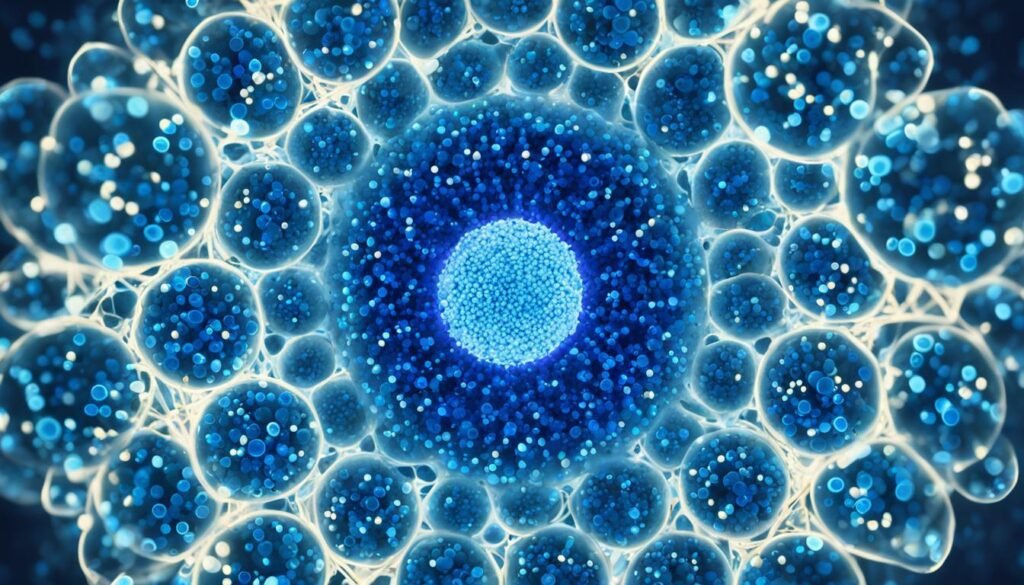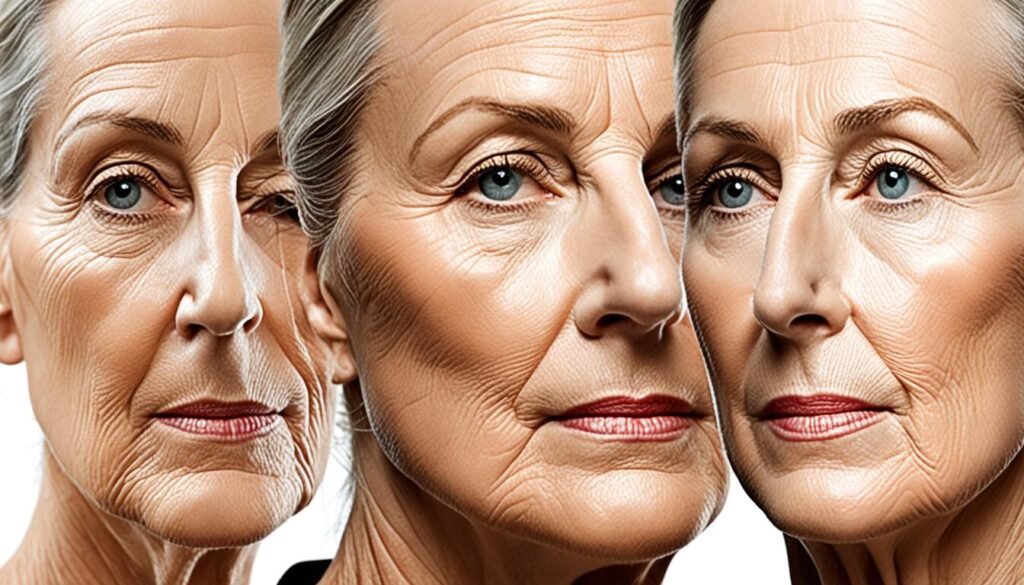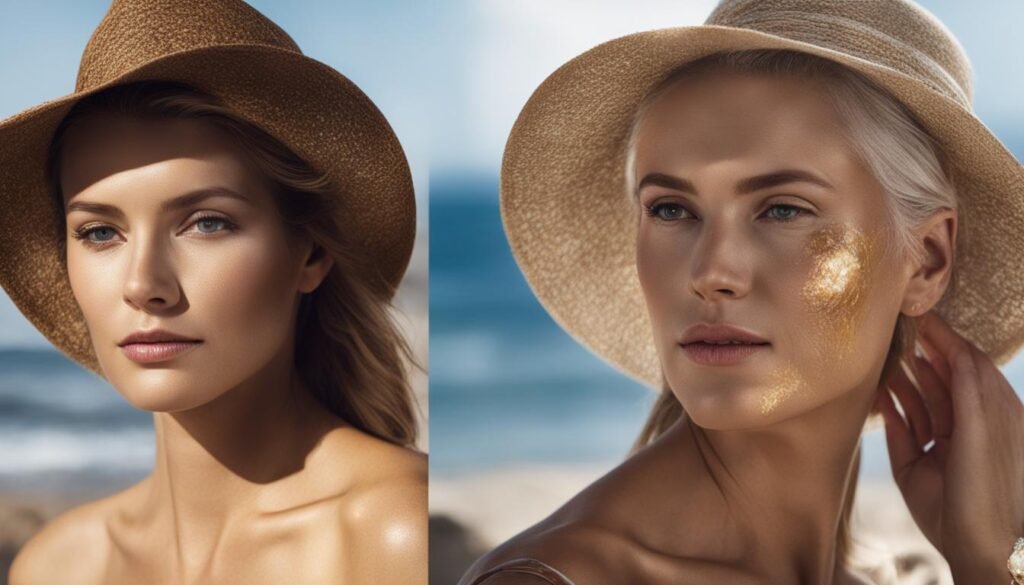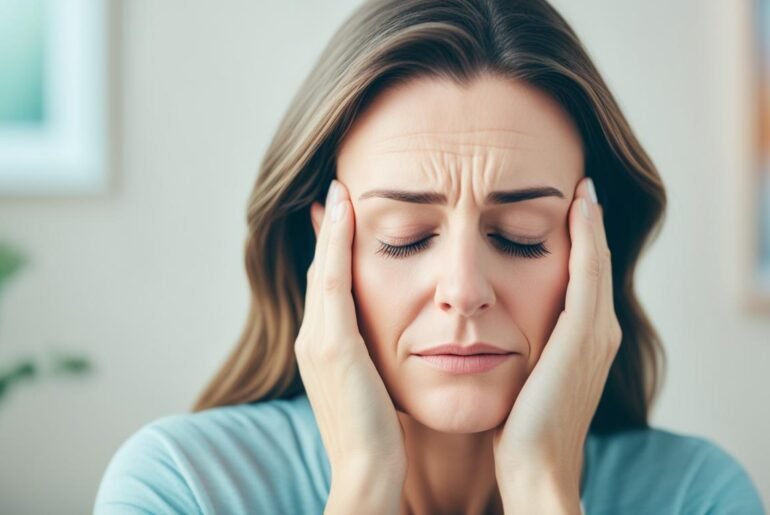Did you know that a high-stress lifestyle can make you look up to 3.5 years older? It’s true! Stress has a significant impact on the aging process of the skin, leading to dehydration, sallowness, roughness, and the development of deep expression lines. But there’s good news – by addressing stress and its effects on the skin, you can slow down the aging process and maintain healthier, more youthful-looking skin.
Lorem ipsum dolor sit amet, consectetur adipiscing elit, sed do eiusmod tempor incididunt ut labore et dolore magna aliqua. Ut enim ad minim veniam, quis nostrud exercitation ullamco laboris nisi ut aliquip ex ea commodo consequat.
Key Takeaways:
- Reducing stress is essential in slowing down the aging process of the skin.
- Stress can lead to dehydration, sallowness, roughness, and the development of deep expression lines.
- By managing stress, practicing good skincare habits, and adopting a healthy lifestyle, you can maintain a youthful appearance and promote skin health.
- Implement stress reduction techniques such as meditation, exercise, and hobbies to lower stress levels and improve skin health.
- Collaborate with a primary care physician to develop a personalized stress management plan and skincare routine.
The Link Between Stress and Skin Aging
Stress has a profound impact on the aging process of the skin. The release of stress hormones, such as cortisol, can lead to various skin issues, including dehydration, sallowness, roughness, and the formation of deep expression lines. These factors contribute to premature aging of the skin, making it appear older than it actually is.
Understanding the link between stress and skin aging is crucial in developing effective strategies to slow down the aging process and maintain a youthful and healthy complexion.
When we experience stress, our bodies produce higher levels of stress hormones, including cortisol. Elevated cortisol levels have been linked to numerous negative effects on the skin, such as:
- Dehydration: Stress hormones can impair the skin’s natural ability to retain moisture, leading to dryness and dullness.
- Sallowness: Increased cortisol levels can affect blood flow to the skin, resulting in a yellowish or dull complexion.
- Roughness: Stress hormones can disrupt the skin’s natural renewal process, causing a buildup of dead skin cells and uneven texture.
- Deep Expression Lines: Cortisol can break down collagen and elastin, two essential proteins that maintain the skin’s firmness and elasticity. This loss of support results in the formation of deep wrinkles and fine lines.
In summary, stress can accelerate the aging process of the skin by disrupting its natural functions and causing various visible signs of aging. By addressing stress and its effects on the skin, we can implement strategies to slow down premature aging and promote a more youthful and radiant complexion.
Telomeres and Skin Aging

Telomeres are protective caps at the ends of chromosomes that play a crucial role in maintaining the integrity of genetic information during cell division. These tiny structures act like the plastic tips at the end of shoelaces, preventing the chromosomes from fraying or sticking to each other. They protect the vital genetic information inside our cells, ensuring the proper functioning of our body.
However, as cells divide and reproduce, telomeres naturally shorten. With each replication, a small portion of the telomere is lost, like a candle burning down. Eventually, when the telomere becomes too short, the cell can no longer divide and enters a state called cellular senescence or undergoes programmed cell death.
This shortening of telomeres is a normal part of the aging process. However, stress has been found to accelerate this shortening, leading to premature aging of the skin. When telomeres become critically short, it affects the integrity and stability of the genetic material inside the cell, causing cellular dysfunction and aging-related changes.
Stress can have a direct impact on telomeres. Studies have shown that chronic psychological stress can cause telomeres to shorten at an accelerated rate, leading to cellular damage and dysfunction. This can manifest in the skin as a thinning of the dermis, a decrease in collagen and elastin fibers, and a loss of skin firmness and elasticity. As a result, sagging skin and the formation of wrinkles become more prominent.
Understanding the relationship between stress, telomeres, and skin aging is crucial in developing effective strategies to combat premature aging. By managing stress and implementing healthy lifestyle habits, we can potentially slow down the shortening of telomeres and maintain the youthfulness and vitality of our skin.
The Impact on the Skin Barrier
The skin barrier plays a crucial role in protecting the skin from harmful toxins and allergies while preventing water loss. However, emotional stress can disrupt the functioning of the skin barrier, leading to dryness and increased visibility of lines and wrinkles.
When we experience stress, our body releases stress hormones like cortisol, which can weaken the skin barrier. This compromises its ability to retain moisture and shield the skin from external irritants. As a result, the skin becomes more susceptible to dehydration, causing dryness and rough texture.
Furthermore, a compromised skin barrier can lead to an increased risk of developing allergies and sensitivity to certain substances. The weakened barrier allows potential allergens to penetrate the skin, triggering inflammatory responses and causing redness, itching, and irritation.
Moreover, the impaired skin barrier fails to effectively lock in moisture, resulting in water loss from the skin. This can exacerbate the appearance of visible lines and wrinkles, making them more prominent and contributing to an aged appearance.
It is essential to prioritize the maintenance of a healthy skin barrier to preserve the youthful look and overall health of the skin. By implementing stress management techniques, such as mindfulness, exercise, and adequate sleep, we can reduce stress levels and support the integrity of the skin barrier.
Emotional stress can disrupt the skin barrier, leading to dryness, increased visibility of lines and wrinkles, and heightened risk of allergies. Prioritizing stress management is key to preserving a healthy skin barrier.
In addition, incorporating a skincare routine with products that nourish and strengthen the skin barrier is crucial. Look for ingredients like ceramides, hyaluronic acid, and niacinamide, which help enhance the barrier function and retain moisture.
To illustrate the impact of stress on the skin barrier, consider the following table that highlights the key symptoms and consequences:
| Symptoms | Consequences |
|---|---|
| Dryness and rough texture | Increased water loss and compromised protection |
| Sensitivity and irritation | Risk of allergies and inflammatory skin conditions |
| Visible lines and wrinkles | Prominent signs of aging |
By understanding the impact of stress on the skin barrier, we can take proactive steps to mitigate its effects. Prioritizing stress reduction, investing in barrier-supporting skincare products, and maintaining a healthy lifestyle can all contribute to the preservation of a strong and resilient skin barrier.
Oxidative Stress and Skin Aging

Oxidative stress is a condition characterized by an imbalance between free radicals and antioxidants in the body. Free radicals are highly reactive molecules that can cause damage to cells and tissues. When the production of free radicals exceeds the body’s antioxidant defenses, oxidative stress occurs.
Emotional stress, along with other factors such as exposure to toxins, UV radiation, smoking, and poor nutrition, can contribute to oxidative stress. These stressors increase the production of free radicals, overwhelming the body’s antioxidant capacity and leading to cellular damage.
“Oxidative stress arises when the balance between the production of reactive oxygen species (ROS) and antioxidant defenses is skewed towards the former.” – Professor Mark Rinner, Dermatologist
Oxidative stress can have detrimental effects on the skin, leading to various health issues. One of the visible effects of oxidative stress on the skin is the development of pigmented spots or age spots. These spots result from the accumulation of melanin, the pigment responsible for skin color, in response to oxidative damage.
Furthermore, oxidative stress can contribute to the formation of wrinkles and skin sagging. Free radicals degrade collagen and elastin, two proteins essential for maintaining the skin’s elasticity and firmness. As these structural components break down, the skin loses its ability to bounce back, resulting in the appearance of wrinkles and sagging.
To counteract the effects of oxidative stress, it is important to incorporate antioxidants into your skincare routine and diet. Antioxidants neutralize free radicals, preventing them from damaging cells and reducing the risk of skin aging.
| Antioxidant Sources | Benefits |
|---|---|
| Fruits and vegetables (e.g., berries, leafy greens) | Rich in vitamins A, C, and E, which help protect the skin from oxidative stress |
| Green tea | Contains polyphenols that have antioxidant and anti-inflammatory properties |
| Dark chocolate | Contains flavonoids that can help improve skin hydration and elasticity |
By including antioxidant-rich foods in your diet and using skincare products that contain antioxidants, you can support your skin’s health and defense against oxidative stress.
Oxidative stress is a complex process that can significantly impact the aging of the skin. By understanding the causes and effects of oxidative stress, we can take proactive steps to protect our skin and maintain its youthful appearance.
The Role of Glycation
Glycation is a process that occurs when sugar molecules in the blood bond with proteins like collagen, leading to the rearrangement of the skin structure and a loss of elasticity. This can result in the formation of wrinkles and a less youthful appearance.
Stress can contribute to glycation by triggering the release of cortisol, which releases sugar into the bloodstream. Therefore, individuals who are prone to stress may experience more severe glycation effects on their skin.
To maintain a youthful appearance, it is recommended to limit sugar intake and manage stress levels effectively. By reducing the amount of sugar in the blood, the glycation process can be slowed down, helping to preserve the skin’s elasticity and overall youthful appearance.
The image above illustrates the process of glycation and its impact on the skin structure.
Effects of Glycation on the Skin:
| Effects | Description |
|---|---|
| Loss of Elasticity | Glycation disrupts the collagen and elastin fibers, leading to a decrease in skin elasticity. |
| Wrinkles | Glycation contributes to the formation of wrinkles and fine lines on the skin. |
| Skin Sagging | The rearrangement of the skin structure due to glycation can result in sagging skin. |
By understanding the role of glycation and taking proactive steps to limit sugar intake and manage stress levels, individuals can maintain a more youthful appearance and promote healthier skin.
Controlling Stress-Related Skin Aging

When it comes to maintaining youthful-looking skin, managing stress is a crucial factor. By implementing effective stress reduction techniques and making mindful lifestyle choices, you can keep stress-related skin aging at bay. Here are some strategies to help you control stress and protect your skin:
1. Stress Management Techniques
Engaging in activities that bring joy and relaxation can significantly reduce stress levels and promote overall well-being. Consider incorporating hobbies like painting, gardening, or yoga into your routine. Meditation and deep breathing exercises can also help calm your mind and alleviate stress. Additionally, regular physical exercise boosts endorphins, improves sleep, and contributes to a more balanced state of mind.
2. Skin-Friendly Diet
What you eat directly impacts the health of your skin. A diet rich in antioxidants, vitamins, and minerals can provide essential nutrients that support skin health. Opt for foods like berries, leafy greens, fish, nuts, and seeds. These are packed with skin-loving nutrients that combat free radicals and promote a youthful complexion.
3. Limit Sugar Intake
Excessive sugar consumption can contribute to accelerated skin aging through a process called glycation. To maintain a youthful appearance, it’s crucial to limit your sugar intake. Opt for natural sweeteners like honey or maple syrup, and be mindful of hidden sugars in processed foods and beverages.
4. Sun Protection
Protecting your skin from harmful UV rays is essential to preserve its health and prevent premature aging. Ensure you apply a broad-spectrum sunscreen with a high SPF, wear protective clothing, hats, and sunglasses, and seek shade during peak sun hours. These measures help defend against sun damage and maintain a youthful complexion.
5. Collaboration with a Primary Care Physician
Partnering with a primary care physician can provide valuable guidance and support in managing stress and its impact on your skin. Your physician can help create a personalized stress management plan, offer recommendations for healthy lifestyle choices, and monitor your overall well-being.
“Managing stress is not only beneficial for your mental and emotional well-being but also plays a significant role in maintaining healthy and youthful-looking skin.”
By combining stress reduction techniques, adopting a skin-friendly diet, prioritizing sun protection, and collaborating with your primary care physician, you can effectively control stress-related skin aging. Embracing a holistic approach to skin care involves taking care of your mind and body, ensuring optimal skin health for years to come.
Importance of Exercise and Nutrition

Exercise and nutrition play vital roles in maintaining a healthy and youthful appearance. Not only do they contribute to overall well-being, but they also have significant benefits for the skin.
Exercise for Improved Circulation
Regular exercise and physical activity promote improved circulation throughout the body, including the skin. Increased blood flow delivers essential nutrients and oxygen to the skin cells, promoting a healthy, vibrant complexion. It also aids in the removal of toxins, resulting in a clearer, more radiant appearance.
“Exercise boosts circulation, allowing the skin to receive the nutrients it needs to stay healthy and maintain a youthful glow.” – Dr. Samantha Lewis, Dermatologist
Engaging in activities such as brisk walking, jogging, cycling, or dancing can have a positive impact on the skin’s health and appearance. Aim for at least 30 minutes of moderate-intensity exercise most days of the week to reap the benefits.
Nutrition for a Youthful Appearance
The saying “you are what you eat” holds true when it comes to skin health. Proper nutrition is crucial for maintaining a youthful appearance. Consuming a diet rich in antioxidants, vitamins, and minerals can support healthy skin and combat signs of aging.
Include a variety of fruits, vegetables, whole grains, lean proteins, and healthy fats in your daily meals. These foods provide essential nutrients that promote collagen production, protect against oxidative stress, and maintain skin elasticity.
Hydration for Healthy, Vibrant Skin
Hydration is key to maintaining healthy and vibrant skin. Adequate water intake helps to flush out toxins, keeps the skin moisturized, and improves its elasticity.
Additionally, using hydrating skincare products can further support the skin’s hydration levels. Look for products that contain moisturizing ingredients such as hyaluronic acid and ceramides.
Remember to protect your skin from external factors that can contribute to dehydration, such as excessive sun exposure and harsh weather conditions. Regularly apply a broad-spectrum sunscreen with at least SPF 30 to shield your skin from harmful UV rays.
Summary
Exercise, nutrition, and hydration are essential components of a comprehensive skincare routine. Regular physical activity improves circulation, promoting a healthy and vibrant complexion. A nutrient-rich diet provides the necessary building blocks for maintaining a youthful appearance. Finally, proper hydration supports skin health and vitality. By prioritizing exercise, nutritious eating habits, and adequate hydration, you can achieve healthier, more youthful-looking skin.
| Exercise and Nutrition | Benefits |
|---|---|
| Improved Circulation | – Delivers essential nutrients to the skin – Removes toxins for a clearer complexion |
| Proper Nutrition | – Supports collagen production – Fights against oxidative stress – Maintains skin elasticity |
| Hydration | – Flushes out toxins – Moisturizes the skin – Improves skin elasticity |
Sun Protection and Skin Health

Protecting the skin from harmful UV rays is crucial in preventing skin damage and premature aging. Exposure to UV rays can lead to sunburn, wrinkles, age spots, and even skin cancer. To keep your skin healthy and protected, it is important to incorporate sun protection measures into your daily routine.
One of the most effective ways to shield your skin from the sun is to apply a broad-spectrum sunblock with a Sun Protection Factor (SPF) of 30 or higher. This will help block both UVA and UVB rays, providing comprehensive protection against harmful sun exposure.
Additionally, wearing hats and sunglasses can offer extra defense against UV radiation. Wide-brimmed hats can provide shade for your face and neck, reducing direct sun exposure. Sunglasses with UV protection can help shield your eyes and the delicate skin surrounding them from potential damage.
Another great way to protect your skin is by wearing sun-protective clothing. These specialized garments are designed with tightly woven fabrics that create a physical barrier between your skin and the sun. Look for clothing with UPF (Ultraviolet Protection Factor) ratings, which indicate the level of UV protection provided.
Remember, sun protection should be a year-round habit, not just during hot summer months. Even on cloudy days, UV rays can penetrate the atmosphere and reach your skin. Incorporating sun protection measures into your daily routine will help maintain the health and appearance of your skin.
| Benefits of Sun Protection | Consequences of Sun Damage |
|---|---|
|
|
Conclusion
Reducing stress is crucial for slowing down the aging process of the skin. By implementing effective stress reduction techniques, maintaining a skin-friendly diet, practicing sun protection, and collaborating with a primary care physician, we can protect our skin from the detrimental effects of stress and promote healthier, more youthful-looking skin.
Stress has been linked to skin aging, as it triggers the release of hormones like cortisol that can cause dehydration, sallowness, roughness, and the development of deep expression lines. Additionally, stress can accelerate telomere shortening, leading to a decrease in collagen and elastin fibers, resulting in sagging skin and wrinkles.
To control stress-related skin aging, it is important to manage stress through techniques such as engaging in hobbies, meditation, and exercise. Adopting a skin-friendly diet rich in antioxidants, limiting sugar intake, and protecting the skin from UV rays are also crucial. Collaborating with a primary care physician can provide personalized guidance and support in managing stress.
By taking care of both our mind and body, we can achieve optimal skin health and enjoy the benefits of a more youthful appearance. Reducing stress is the key to slowing down skin aging and maintaining healthy, beautiful skin.
FAQ
How does stress affect the aging process of the skin?
Stress triggers the release of hormones like cortisol, which can cause dehydration, sallowness, roughness, and the development of deep expression lines, leading to premature aging of the skin.
How does stress accelerate skin aging at a cellular level?
Stress accelerates telomere shortening, causing thinning of the dermis, a decrease in collagen and elastin fibers, and resulting in sagging skin and the formation of wrinkles.
How does stress impact the functioning of the skin barrier?
Emotional stress can interfere with the skin barrier’s ability to protect against toxins and allergies, leading to dryness and increased visibility of lines and wrinkles.
What is oxidative stress, and how does it contribute to skin aging?
Oxidative stress occurs when there is an imbalance between free radicals and antioxidants in the body. Emotional stress, along with other factors like exposure to toxins and UV radiation, can contribute to oxidative stress, resulting in pigmented spots, wrinkles, and skin sagging.
How does stress contribute to glycation and its impact on the skin?
Stress triggers the release of cortisol, which releases sugar into the bloodstream, contributing to glycation. Glycation leads to the rearrangement of skin structure and loss of elasticity, affecting the youthful appearance of the skin.
You can manage stress through techniques like engaging in hobbies, meditating, and exercising. Adopting a skin-friendly diet rich in antioxidants, limiting sugar intake, and collaborating with a primary care physician can also be beneficial in managing stress.
How does exercise and nutrition impact skin aging?
Regular exercise and physical activity reduce stress levels and improve circulation, promoting healthy skin. Proper nutrition, including a diet rich in antioxidants, is also essential for maintaining a youthful appearance.
How important is sun protection for skin health?
Protecting the skin from harmful UV rays is crucial in preventing skin damage and premature aging. Wearing broad-spectrum sunblock, hats, sunglasses, and sun-protective clothing provides extra protection for the skin.




